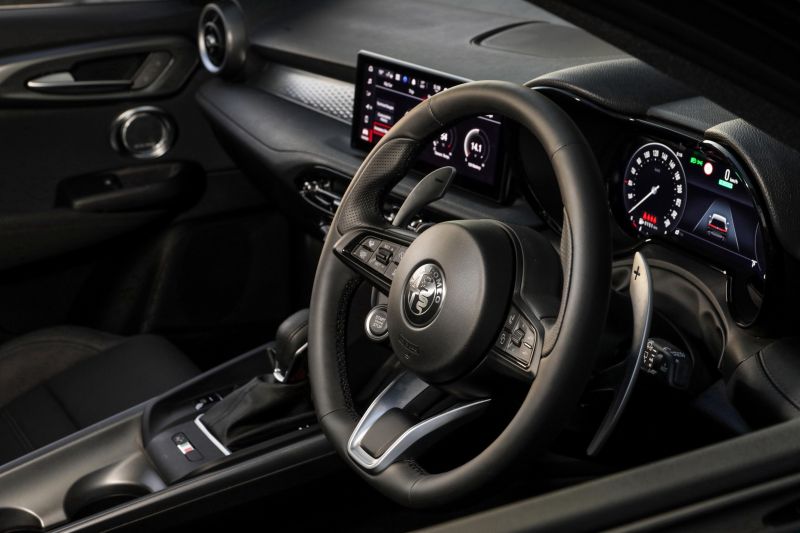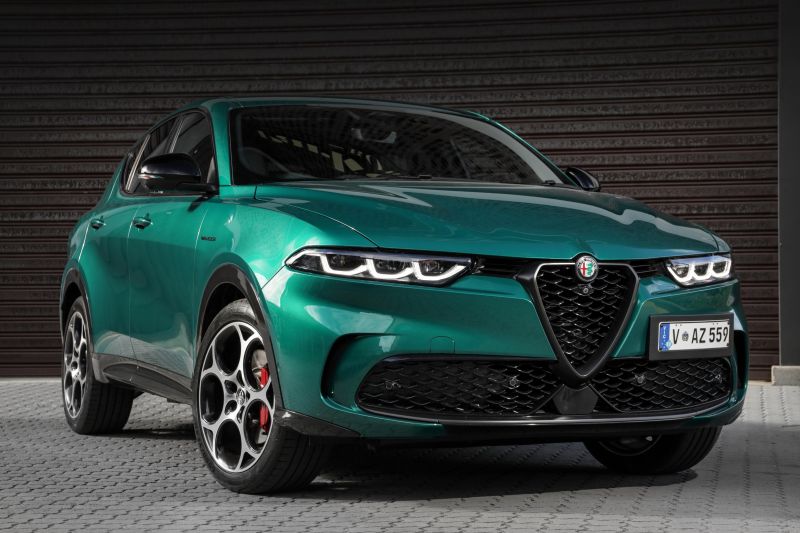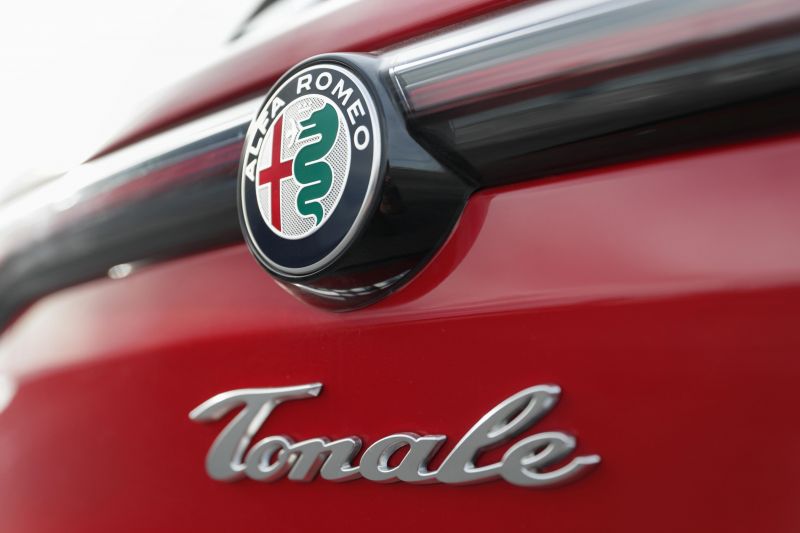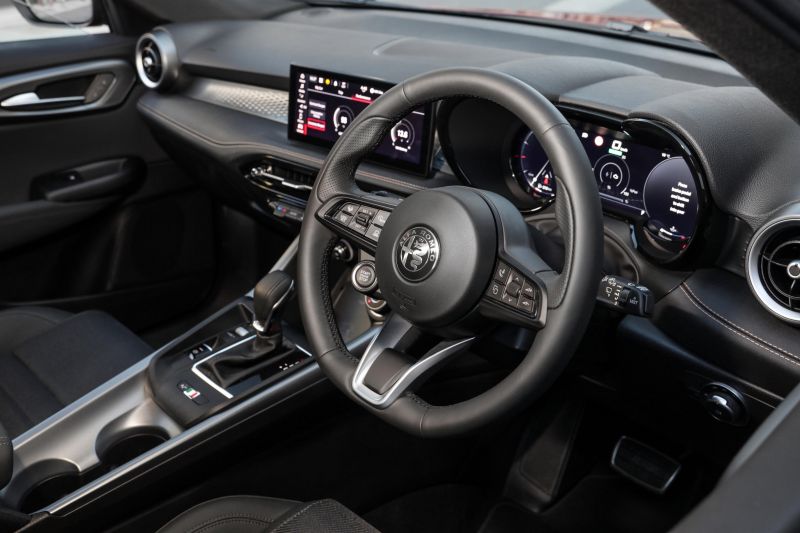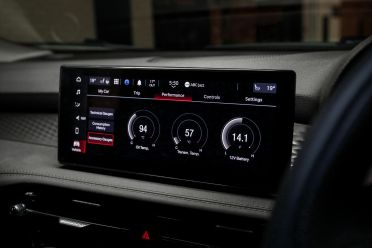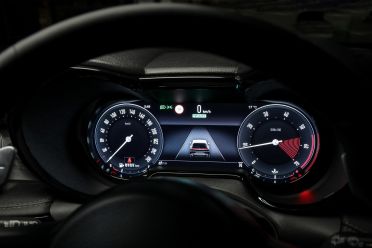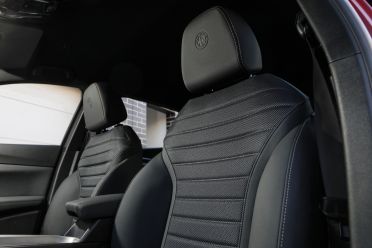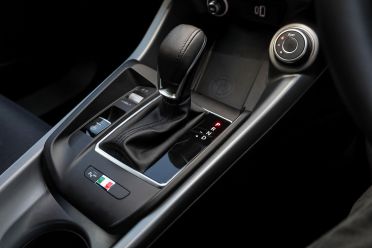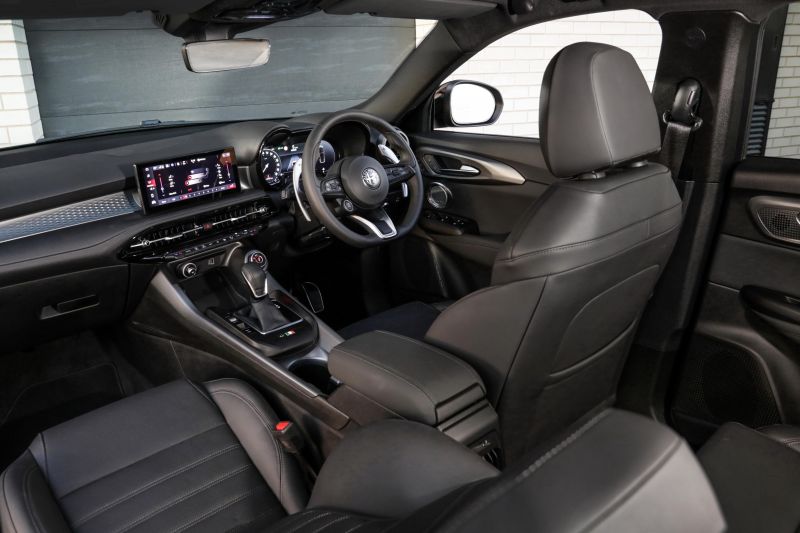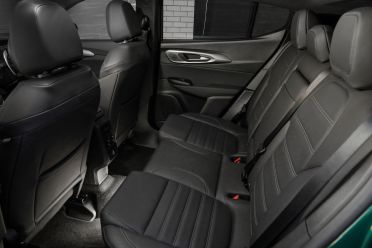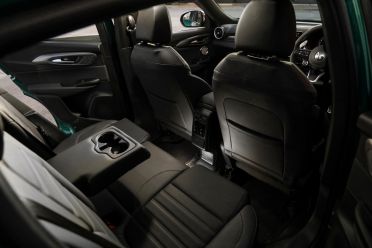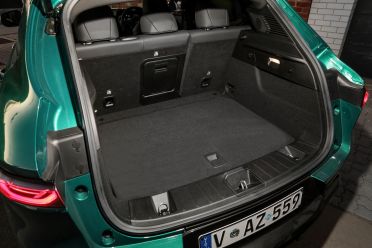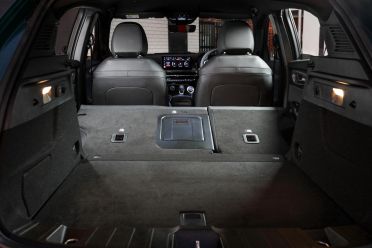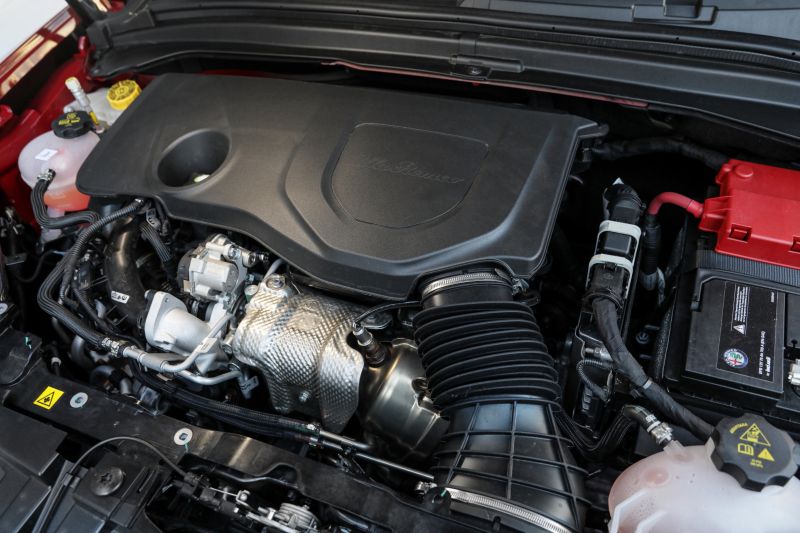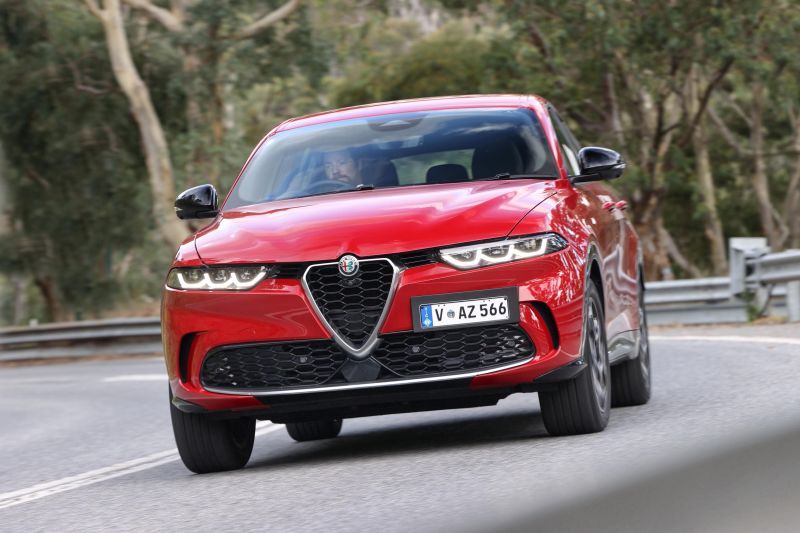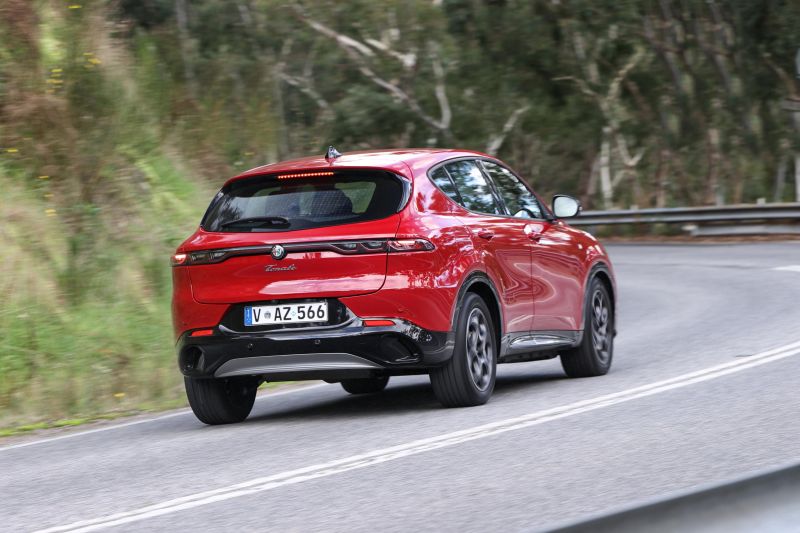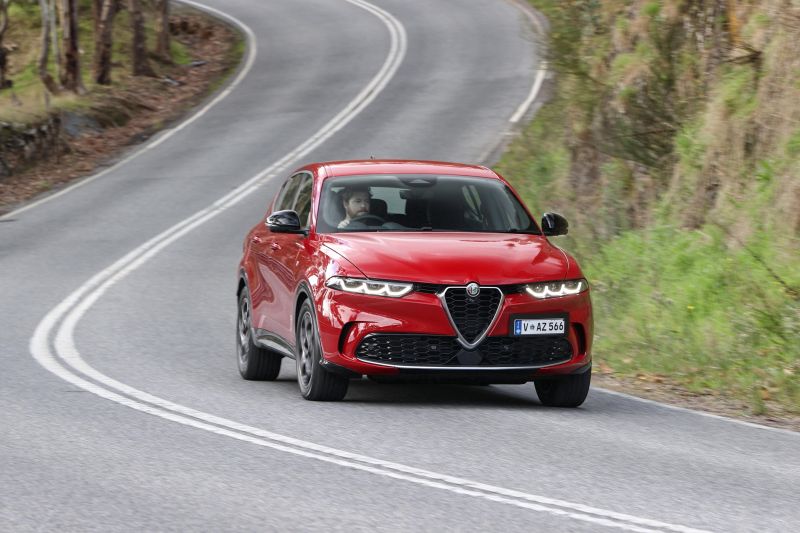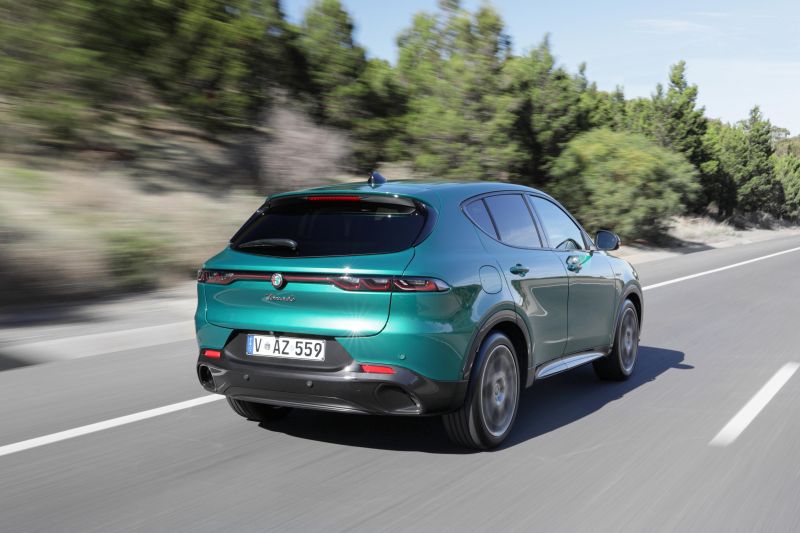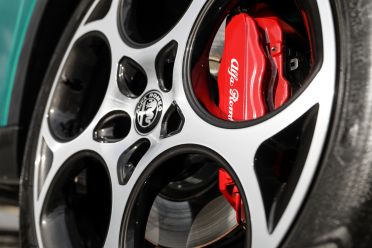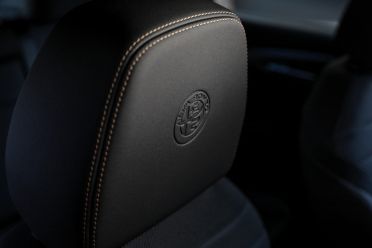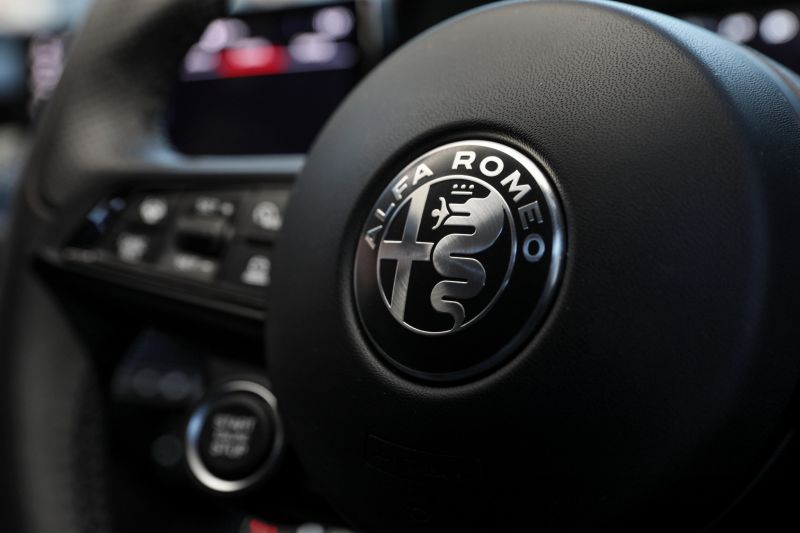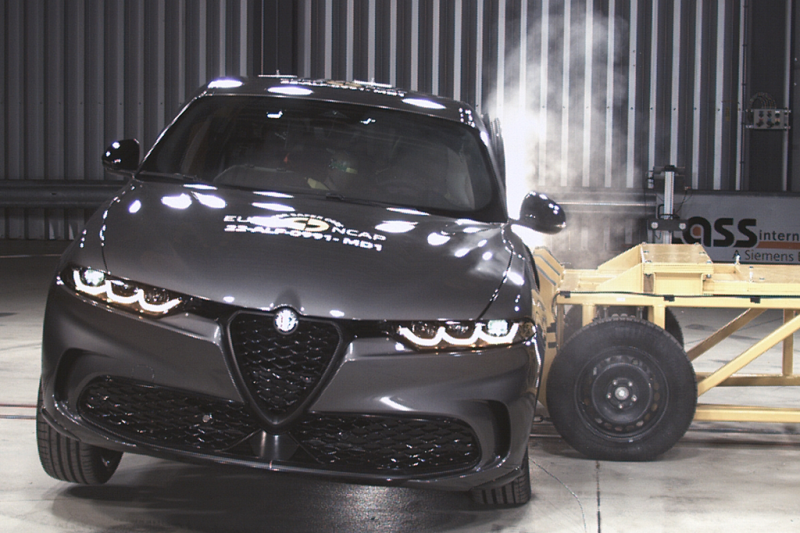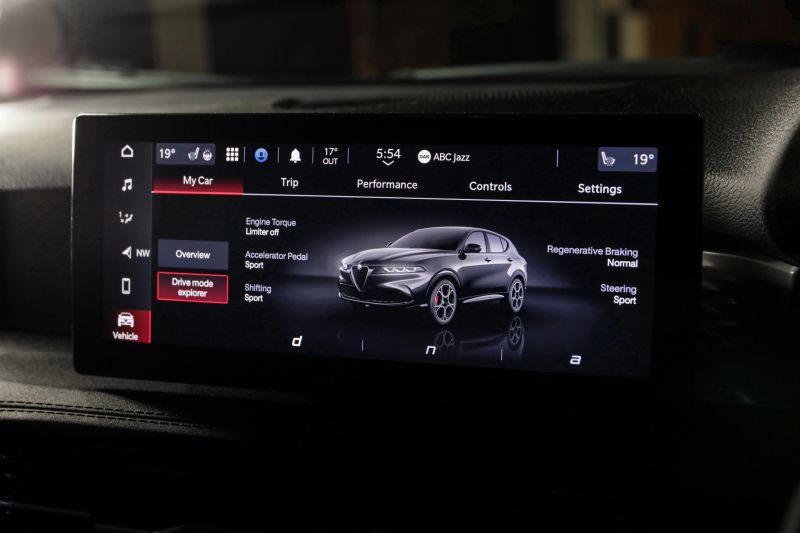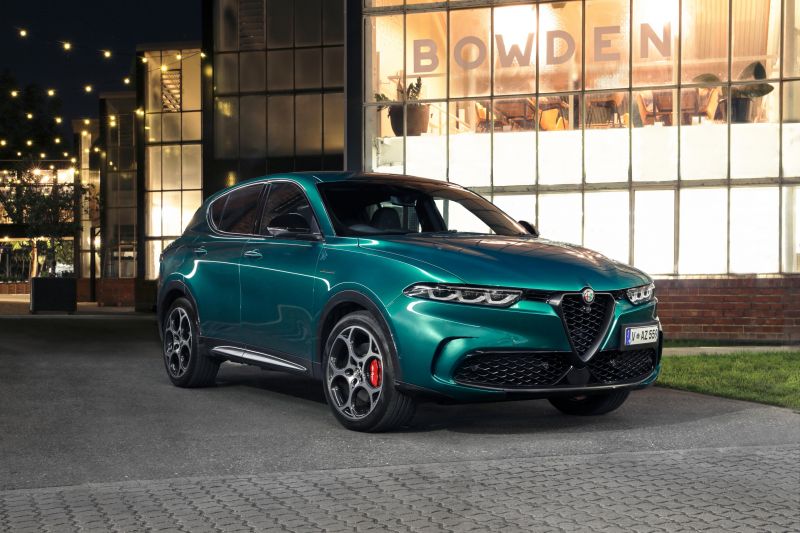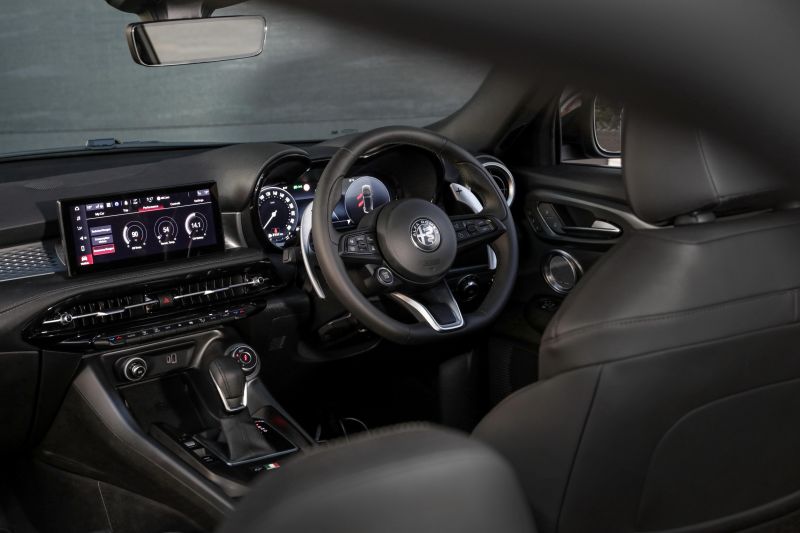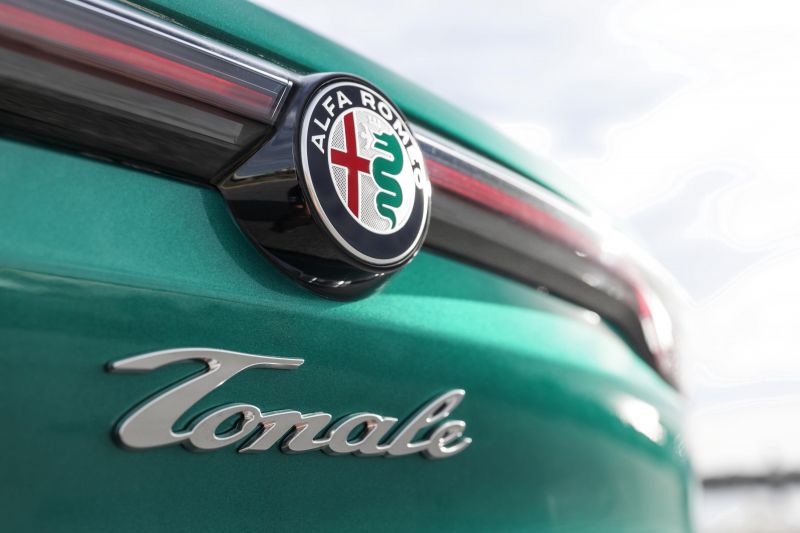Say ciao to the most important Alfa Romeo of recent times.
The 2023 Alfa Romeo Tonale is a critical car for the storied Italian marque. It will serve as a key volume driver in one of the world’s most competitive new car segments, and serves as a new entry point into the range given the Giulietta hatchback is no more.
Yes, it’s a front-wheel drive SUV sharing its bones loosely with the Jeep Compass, but the Tonale is billed as the “most technologically advanced Alfa ever”, debuting a number of features for the brand as well as an electrified powertrain.
At launch in Australia, the Tonale will be solely available with a 1.5-litre turbocharged 48V Hybrid FWD drivetrain, with a more powerful Tonale Plug-in Hybrid Q4 with electrified all-wheel drive due before the end of the year.
It arrives well priced, starting at a smidgen under $50,000 before on-roads, boasting strong claimed fuel economy, high levels of standard equipment relative to more expensive premium rivals, as well as one of the larger interiors of the segment.
Does the Tonale have what it takes to take on established German rivals, as well as the likes of Lexus and Volvo?
How much does the Alfa Romeo Tonale Hybrid cost?
The Tonale range opens at $49,900 plus on-road costs for the entry-level Ti.
Pricing climbs to $56,400 before on-roads for the Tonale Hybrid Veloce, with a handful of options and packages available for each.
That’s pretty sharp for the class, undercutting the Audi Q3 (from $50,600), BMW X1 (from $60,400) and Mercedes-Benz GLA (from $63,200). Other alternatives include the Jaguar E-Pace (from $71,070) and Volvo XC40 (from $53,490).
You could also logically cross-shop the Tonale against high-spec mid-sized SUVs like the Mazda CX-5, Subaru Forester and Toyota RAV4 which play in the $50,000-$60,000 realm.
Perhaps a left-field alternative is the Cupra Formentor, which like the Alfa has a focus on design and dynamics. Prices range from $54,990 drive-away to $59,490 drive-away for the 140kW V and 180kW VZ; the trims most aligned with the Tonale line-up.
2023 Alfa Romeo Tonale pricing:
- Alfa Romeo Tonale Hybrid Ti: $49,900
- Alfa Romeo Tonale Hybrid Veloce: $56,400
Prices exclude on-road costs
What is the Alfa Romeo Tonale Hybrid like on the inside?
Alfa Romeo prides itself on making cars for drivers, and the Tonale’s cabin does have a driver-focused vibe.
From the signature Alfa steering wheel and driver-angled centre stack, to the rounded air vents that are reminiscent of airplane engine turbines, the Tonale’s cabin design has clear links to the Giulia and Stelvio.
Despite the Tonale’s entry-level status, the little crossover debuts Alfa’s latest and greatest features and technologies – hence the company is pitching it as the most technologically advanced Alfa ever.
The 12.3-inch Cannocchiale digital instrument cluster – ‘cannocchiale’ is Italian for telescope or binoculars – is a stunning take on the virtual binnacle, with several layouts and options including one that apes Alfa’s classic round dials and typeface.
Both displays are a big step forward for Alfa, offering sharp resolution and snappy response to inputs, and enough differentiation from other Stellantis products running similar interfaces – after all, this is running the Uconnect 5 software that also underpins Jeep and Ram technology.
There’s standard wireless Apple CarPlay and Android Auto which worked faultlessly, while the embedded navigation system and menus offer the level of functionality you’d expect of a premium infotainment system at this price point.
Even better, the Tonale debuts My Alfa Connect to the Australian market, with headline features including remote locking/unlocking, remote diagnostics and health checks, remote destination entry (send to the vehicle’s navigation over the air), as well as Home to Vehicle integration via Amazon Alexa.
The full suite of features will come with a complimentary three-year subscription with purchase, with certain features to be available for a fee after the trial ends. Pricing is still to be announced.
You can access the My Alfa Connect services via a compatible smartphone as well as a desktop application. Read more here.
Comfort up front is pretty good, with supportive seats offering good levels of adjustment. The standard fabric trim and manual seat adjusters work just fine, though the optional leather-trimmed units with electric adjustment feel more upmarket – the perforated hide is lovely to touch too.
Tick the box for leather seats as part of the $4500 Lusso Pack on both grades and you get driver’s memory presets as well as heating and ventilation. The touchscreen controls aren’t my favourite, and the heated steering wheel button hasn’t been relocated to the driver’s side for RHD – perhaps something for a software update, Alfa Romeo.
Alfa has done well to make the first row feel premium as well, with soft-touch materials and stitched accents throughout the upper and middle tiers of the cabin, and a nice mix of textures and surfaces.
I particularly like the stitched leatherette element across the dashboard, and the chunky leather shifter. Opt for the Veloce and you get those signature oversized aluminium paddle shifters behind the steering wheel.
There are bits I don’t like, however, such as the heavily grained texture on the upper cabin plastics that make it look like aged leather, as well as the aluminium-look plastic bits that just look and feel a touch cheap. A light interior option would also be nice – where’s that lovely saddle tan Italian leather option, Alfa?
Storage is pretty good in the front row too, with plenty of nooks and crannies to store your odds and ends.
There’s a big cubby under the centre console where the wireless phone charger is located, but it’s big enough to fit other items on top if you need.
A pair of cupholders sit within the centre console, and there are pockets in the doors large enough to fit 1L bottles.
Between the front seats also is a lidded storage area under the front-centre armrest, meaning your key bases are covered. However, the BMW X1 and Volvo XC40 are still the storage and practicality benchmarks.
It’s a similar story in the back, with good room for above average-sized adults. I’m 6’1 and I can fit behind my own driving position, if a little snugly.
At the global launch of the Tonale Plug-in Hybrid Q4, Alfa Romeo made bold claims about the space on offer – claiming the Tonale has been designed to house four 1.9m tall adults at the same time.
The Tonale is definitely at the upper end of the class for rear accommodation, but taller occupants will be approaching the headliner sitting upright, and the rising shoulder line means outward visibility isn’t as the aforementioned X1 or XC40, let alone something like the boxy Mini Countryman.
Unlike some rivals, the Tonale’s rear doors get hard plastic up top rather than soft-touch materials, which is a shame.
There are, however, rear air vents as well as USB-A and USB-C ports behind the centre console, map pockets behind both front seats, 1L bottle holders in the doors, and a fold-down centre armrest with two additional cup holders.
Alfa Romeo quotes a 500L boot for global versions of the Tonale Hybrid, though Australia’s standard fitment of the space-saver spare wheel means the luggage capacity is slightly different – we’re still waiting for the company to confirm exact figures.
Fold down the rear seats and there’s 1550 litres with no spare wheel. Again, we’re waiting for Alfa Romeo to confirm exact figures for Australian specifications.
That’s not bad for the segment, though various rivals quote similar or greater volumes – for reference, the Audi Q3 (530L-1525L), BMW X1 (540L-1600L) quote more, while the Mercedes-Benz GLA (435L-1430L) and Volvo XC40 (460L-1336L) quote less than the Tonale Hybrid’s global figures.
What’s under the bonnet?
At launch just one powertrain will be available.
Tonale Hybrid models are powered by a 1.5-litre turbocharged four-cylinder petrol engine augmented by a 48V mild-hybrid system incorporating a small electric motor and 0.8kWh lithium-ion battery pack.
While it reads like a mild-hybrid on paper, the Tonale Hybrid actually can offer electric drive, thanks to the gear-driven design of the 48V system.
Outputs are rated at 118kW (5750rpm) and 240Nm (1500rpm) for the petrol engine, while the e-motor is rated at 15kW and 135Nm. This powertrains drive the front wheels via a seven-speed dual-clutch automatic. Alfa Romeo claims the Tonale Hybrid can accelerate from 0-100km/h in 8.8 seconds, with top speed rated at 212km/h.
Claimed fuel economy is rated at a thrifty 5.6 litres per 100km on the combined cycle, with the Tonale’s 55-litre fuel tank demanding minimum 95 RON premium unleaded. The 1.5L unit is homologated to Euro 6d emissions standards, with combined CO2 emissions rated at 129g/km.
How does the Alfa Romeo Tonale Hybrid drive?
Alfa Romeo was really touting the Tonale’s ‘fun to drive’ character – so I was keen to test the claims.
Our launch drive route was a long stint through the Adelaide Hills, featuring windy climbs and a mix of speed limits, perfect for something like a Giulia or a Stelvio. The Tonale? I’m not so sure.
I spent most of my time in the entry-level Ti on 18-inch wheels, and also hopped into a Montreal Green Veloce on the standard 19s – a Misano Blue example with optional 20s was also running around, but we didn’t drive this one.
The first thing you’ll notice is that the 1.5-litre turbo hybrid system isn’t the sportiest of drivetrains, but the Tonale definitely has potential.
In its Normal setting, it’s a relaxed and pretty smooth operator. The 48V system generally smooths out the low-speed jitters commonly associated with dual-clutch automatics, though occasionally it can feel a little elastic if you try to punch it from a standstill.
On the winding B-roads through the Adelaide Hills, the Tonale was best left in its Dynamic mode which makes a notable difference to throttle response and steering feel.
It meant the 1.5L Hybrid drivetrain was constantly primed to give optimum response, and it actually has decent pep for what is an entry-level product – it just feels a little out of touch with the chassis, which feels quite capable of handling more grunt.
Give it some flatter ground and high-speed sweeping bends, and the Tonale feels great. It’s planted and sure-footed, with quick steering and a pointy nose that speaks to that more sporting DNA the company is shouting about.
There’s good grip too, and despite being front-wheel drive the Tonale Hybrid does a confident job putting its power down without fuss even in the windy, wet conditions we encountered during our drive. It probably helps there’s not a huge amount of grunt to begin with…
I’d like more feedback through the steering wheel, which like the Giulia and Stelvio is quick and direct but light on feel. With that said, the kind of buyer this car will cater to probably will prefer the all-round balance of this calibration, which helps make the Tonale fun and comfortable to thread about the city.
Stepping out of the Ti and into the Veloce, there is a slightly firmer feel thanks to the larger wheels and lower-profile rubber (235/55 v 235/50), but it’s very minor. Plus, the Veloce brings the brand’s Dual Stage Valve Suspension which offers two settings – a standard and a firmer dynamic setting.
In its standard setting the Veloce offers a nice balance between comfort and dynamism much like the Ti, but in the firmer mode there’s more focus dialled into the handling. Again, there’s a sporting bent to the controls and the chassis, but the drivetrain meets its ceiling earlier.
We slowed things down a bit in transit sections between our accommodation in Mount Lofty and the Adelaide Airport, and I was most impressed with the Tonale in these settings.
Driving the Ti on the Sturt Highway in and out of Adelaide, as well as through the outskirts of the Adelaide en route to the airport, the Tonale proved a comfortable and refined commuter.
The drivetrain feels better suited to these environments, and if you have it in its advanced efficiency mode it will really lean on the electrified components, shutting off the petrol engine as soon as you’re coasting or as you’re coming to a stop at around 20km/h. I even managed to get to an indicated 38km/h in EV mode.
Refinement is another strong point for the Tonale, with the cabin and controls well insulated from the petrol engine turning off and firing up again. While at times response off the line can be elastic, the shift from 48V to petrol power is likewise very well resolved and almost seamless save for the added power on tap.
The urban ride is good for the class, with a firmer setup akin to most rivals that lets you feel the road surface without letting it jar through the cabin. More time in town will allow us to better determine how the Tonale deals with the lumps and bumps of everyday commuting.
As for assistance technologies, I think it would be wise to option the Technology Pack if you go for the entry-level Ti.
Standard adaptive cruise control and Matrix LED headlights are all good inclusions, but the added suite of features from the Technology Pack (and standard on Veloce) bring driver assists which we found to be very nicely calibrated.
The Tonale holds a set speed accurately regardless of inclines and declines, and the active lane centring assist did a good job even down the winding descent towards Adelaide on the Sturt Hwy. Blind-spot monitoring and rear cross-traffic alert also feature with the optional tech, which I would argue is a must-have even if you don’t think you need it.
Likewise the surround-view camera system you get with the enhanced suite helps with parking a high-sided vehicle with a tapered window line.
What do you get?
Tonale Ti highlights:
- 18-inch alloy wheels
- Tyre pressure monitoring
- Matrix LED headlights
- Adaptive Driving Beam
- Dynamic indicators
- Automatic high-beam
- Power-folding heated exterior mirrors
- 12.3-inch digital instrument cluster
- 10.25-inch touchscreen infotainment system
- Wireless Apple CarPlay, Android Auto
- DAB radio
- My Alfa Connect services
- 6-speaker sound system
- Wireless charging pad
- USB-A + USB-C ports front, rear
- Keyless entry and start
- Dual-zone climate control
- Electric park brake with auto hold
- 6-way manually adjustable front seats
- Power driver lumbar support
- Carbon cloth/leatherette upholstery, beige stitching
- Leather-wrapped steering wheel
- Aluminium pedals
Tonale Veloce adds:
- Dark Miron body kit with matte inserts
- Privacy glass
- 19-inch alloy wheels
- Brembo red brake calipers
- Gloss black window trim
- Auto-dimming exterior mirrors
- Active Dual Stage Valve Suspension
- Alcantara, leatherette upholstery with red stitching
- Aluminium door sills
- Aluminium paddle shifters
Options
Lusso Pack: $4500
- Heated, ventilated front seats
- Heated steering wheel
- Heated washer nozzle
- Black leather upholstery with dark grey stitching
- 8-way power front seats incl. driver memory
- 14-speaker 465W Harmon Kardon sound system
Technology Pack: $2500 (Ti)
- Auto-dimming mirrors
- Blind-spot assist
- Rear cross-traffic alert
- Side parking sensors
- Surround-view cameras
- Level 2 autonomous driving
- Lane centring assist
- Traffic Jam Assist
20-inch alloy wheels: $1500 (Veloce)
Panoramic sunroof: $2500
Colours
Standard
Premium: $1600
- Alfa Red
- Alfa Black
- Vesuvio Grey
- Misano Blue
Tri-Coat Premium: $2500
Is the Alfa Romeo Tonale Hybrid safe?
The Tonale wears a five-star ANCAP safety rating, based on 2022 Euro NCAP testing.
This rating applies to all Tonale models at launch, with category scores of 84 per cent for adult occupant protection, 87 per cent for child occupant protection, 67 per cent for vulnerable road user protection, and 85 per cent for safety assist.
Standard safety equipment includes:
- 6 airbags
- Adaptive cruise control incl. stop & go
- AEB incl. Pedestrian, Cyclist detection
- Intelligent speed assist
- Lane keep assist
- Parking sensors front, rear
- Reversing camera
- Traffic sign recognition
Tonale Veloce adds:
- Blind-spot monitoring
- Rear cross-traffic alert
- Side parking sensors
- Surround-view cameras
- Level 2 autonomous driving
- Lane centring assist
- Traffic Jam Assist
How much does the Alfa Romeo Tonale Hybrid cost to run?
Like the wider Alfa Romeo range, the Tonale is covered by a five-year, unlimited-kilometre warranty.
The Italian marque also throws in five years of roadside assistance for the duration of the warranty period, with five years of capped-price servicing also offered.
Scheduled maintenance for the Tonale is required every 12 months or 15,000 kilometres – whichever comes first.
It amounts to a pricey $3675 over five years (ouch!), which is more than Audi and BMW charge for the Q3 and X1 respectively, though still well under Mercedes-Benz’s lofty $4500 for the GLA’s five-year service plans.
Alfa Romeo Tonale Hybrid service pricing:
- 12mths/15,000km: $545
- 24mths/30,000km: $645
- 36mths/45,000km: $545
- 48mts/60,000km: $1345
- 60mths/75,000km: $595
Our more dynamic-leaning test route wasn’t indicative of a typical owner’s real-world driving, but we saw high 7.0s into low 8.0s with spirited driving through the winding roads of the Adelaide Hills – which isn’t all that bad.
CarExpert’s Take on the Alfa Romeo Tonale Hybrid
It’s not perfecto, but there’s plenty to like about the Tonale.
From the distinct design to the sharp pricing, solid feature and tech inclusions, as well as the resolved ride and handling and efficient drivetrain, the Tonale has a bit going for it – and it’ll turn heads like nothing else in the class.
It’s impressive value versus segment stalwarts, and offers a powertrain that continues to be rare this side of a Lexus UX250h or NX350h. Above-average practicality is another plus, should passenger and cargo carrying abilities be a high priority for you.
That’s not to say it’s not without flaws; the drivetrain feels underdone relative to the chassis and offers adequate performance, some elements of the cabin aren’t quite up to the standards of segment benchmarks, and the expensive servicing dents the otherwise good value proposition.
I’d also like to see the Technology Package standard across the range, and the inclusions of the Lusso Package standard on the Veloce, as ticking option boxes adds up.
While I understand many will hesitate at the Tonale and Alfa Romeo’s other models due to perceptions around reliability and support, the company was quick to point out the Tonale has been subjected to 4 million kilometres of development testing around the world in regular and “extreme” conditions, including 15,000km in Australia leading up to the launch.
The proof will be in the pudding as first owners take delivery and embark on their first months of ownership, but if you’re looking for a premium small SUV for the daily grind that’s a little different and sparks some emotion, the Tonale Hybrid could be worth a look.
Click the images for the full gallery

